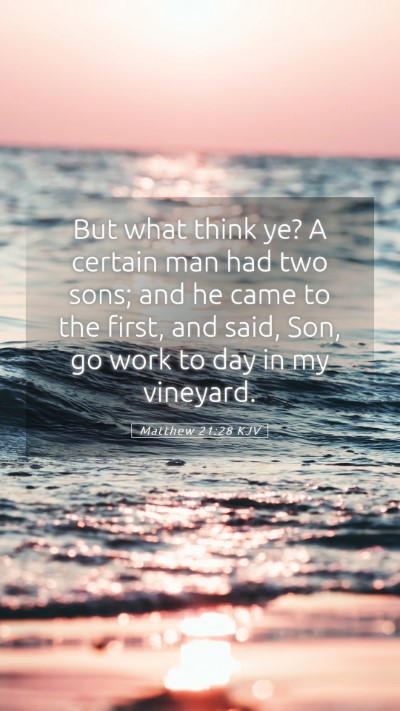Understanding Matthew 21:28
Bible Verse: Matthew 21:28 - "But what do you think? A man had two sons, and he went to the first and said, ‘Son, go work in the vineyard today.’"
Overview of the Verse
This verse introduces a parable spoken by Jesus, illustrating the importance of action over mere words. It sets the stage for discussing obedience and the response of individuals to God's call.
Interpretation of Matthew 21:28
-
Call to Action:
Jesus is referencing a common scenario of parental expectation. The father seeks to engage both sons in work, reflecting the call God places on humanity to be active in His vineyard.
-
Two Sons as Metaphor:
The two sons symbolize different responses to God's commands. The father's direction can be seen as God's instruction, while the sons represent differing attitudes toward obedience.
-
Immediate Reactions:
The first son initially refuses but later repents and goes to work. This reflects a theme of repentance and action, reinforcing that genuine change of heart brings about true obedience.
-
Contrast of Lip Service vs. Genuine Obedience:
Jesus contrasts the first son’s eventual compliance with the second son's initial willingness yet failure to act. This emphasizes the idea that intentions must manifest in actions, akin to the teachings of faith without works being dead (James 2:26).
Commentary Insights
By drawing insights from public domain commentaries, we can further dissect the verse:
-
Matthew Henry:
Henry notes that the parable serves to illustrate that those who may appear disobedient can sometimes achieve true righteousness through their actions, while those who profess obedience without follow-through miss the mark of true faith.
-
Albert Barnes:
Barnes emphasizes the importance of a changed heart that leads to action, indicating that true sonship is not defined simply by outward behavior but by an inner transformation and readiness to obey God's call.
-
Adam Clarke:
Clarke suggests that this parable calls for self-examination among listeners. He interprets the sons as reflections of different attitudes within the community Jesus addressed, urging people to reflect on their own willingness to heed God's commands.
Applications of Matthew 21:28
This verse has profound implications for personal faith and community life:
-
Personal Reflection:
Consider your response to God's call in your life. Have there been times when you expressed willingness but failed to act? This verse invites believers to reflect on their commitments to God.
-
Encouragement in Discipleship:
Believers in Bible study groups can use this passage to discuss the dynamics of obedience, repentance, and the importance of following through with commitments made to God.
-
Community of Faith:
This parable encourages a culture of accountability and encouragement among believers. How can we support one another in overcoming our initial reluctance to serve God actively?
Cross References
- Matthew 3:8: "Bear fruit in keeping with repentance."
- Luke 6:46: "Why do you call me 'Lord, Lord,' and do not do what I say?"
- James 1:22: "Do not merely listen to the word, and so deceive yourselves. Do what it says."
Conclusion
The verse in Matthew 21:28 serves as a poignant reminder of the need for genuine obedience that is evidenced in action. It exhorts believers to move beyond merely professing faith and to actively engage with God's work, making it a rich topic for bible verse interpretations and bible study insights.


